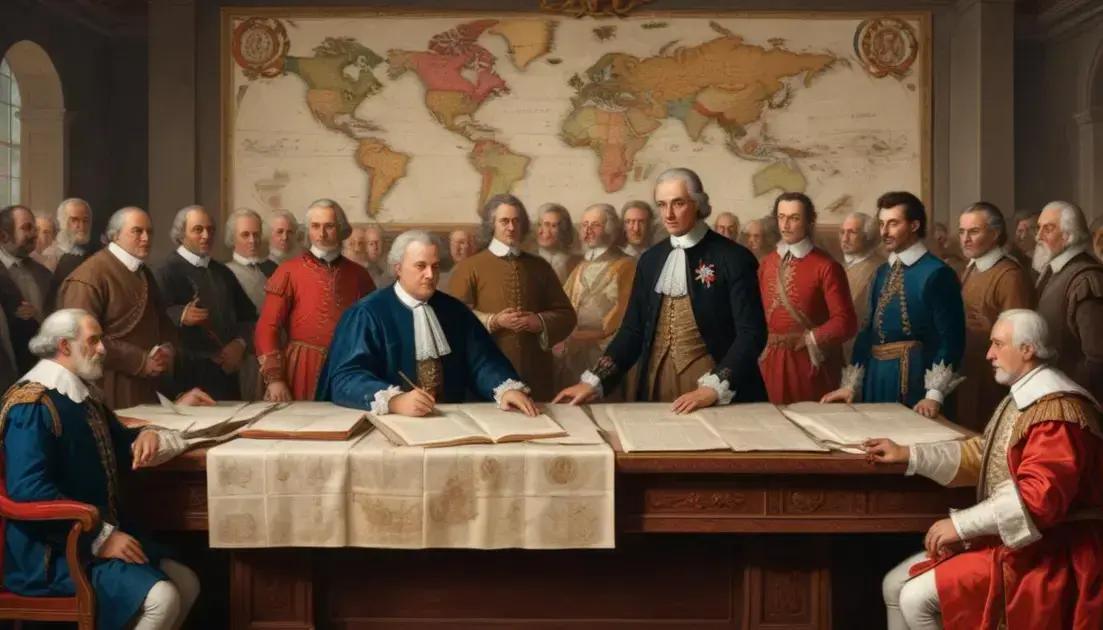
Treaty of Tordesillas: Division Between Spain and Portugal
The Treaty of Tordesillas, signed in 1494, was a pivotal agreement that divided the newly discovered lands between Spain and Portugal. This treaty significantly impacted colonialism, cultural exchange, and global politics, establishing a framework for territorial claims that influenced future relationships among European powers. It also had profound effects on Indigenous populations, leading to cultural changes and conflicts. The legacy of this treaty continues to resonate today, reminding us of the importance of recognizing diverse histories and rights in discussions of colonialism.
Tordesillas stands as a pivotal moment in history, marking the division of the New World between two powerful nations. But what led to this groundbreaking agreement? Buckle up, as we explore its far-reaching effects!
Historical Context
The Treaty of Tordesillas was signed in 1494 between Spain and Portugal. It aimed to resolve disputes over newly discovered lands.
At that time, both nations wanted to expand their territories across the ocean. They were eager to find new trade routes and resources.
This treaty was important for the future of colonialism in the Americas.
Background of the Treaty
Before the treaty, many explorers set sail, seeking wealth and new lands. Columbus’s voyages opened the door for Spanish exploration. Meanwhile, Portugal was focused on Africa and Asia.
The race for territories was on, and the Pope stepped in to help.
Role of the Pope
Pope Alexander VI played a big role. He wanted to keep peace between Spain and Portugal.
He issued a papal bull that drew a line through the Atlantic Ocean. Spain got the west, while Portugal got the east.
This was quite a bold move, but it set the stage for future conflicts.
Impact on Relations
The treaty helped reduce tensions initially. Both countries benefited from their allocated areas.
They started colonizing lands in the Americas, which led to massive changes in local cultures.
However, other nations challenged this agreement later on, leading to more conflicts over territories.
Key Provisions
The Treaty of Tordesillas had several key provisions that shaped colonial powers. The treaty divided the world between Spain and Portugal along a specific meridian.
This line was drawn to settle land claims made by both nations in the New World.
Division of Lands
The treaty established that lands to the west of the line belonged to Spain. Meanwhile, lands to the east were reserved for Portugal.
This meant that Spain could explore and colonize most of South America, while Portugal focused on Brazil and parts of Africa.
These divisions helped clarify territorial claims but also caused resentment among other European nations.
Papal Approval
The treaty was sanctioned by Pope Alexander VI, lending it religious authority.
This approval made the agreement more acceptable to both countries and helped to ease tensions
between them since it was seen as an effort to avoid conflict over lands.
Future Implications
Although the treaty aimed to prevent disputes, it only fueled future conflicts.
As explorers from other European countries like England and France entered the scene, the lines drawn by Tordesillas were increasingly challenged.
In the long run, this treaty created a foundation for colonial rivalries that shaped the modern world.
Impacts on Colonialism
The Treaty of Tordesillas had major impacts on colonialism in the Americas. It changed how countries viewed land ownership and exploration.
This treaty set off a race for territory that shaped the future of two powerful nations.
Colonial Expansion
Spain and Portugal rapidly expanded their empires after the treaty. Spain focused on conquering large parts of South America.
It claimed regions like present-day Peru and Argentina. Meanwhile, Portugal concentrated on Brazil and established trade routes.
This expansion drastically changed local cultures and economies.
Conflicts with Indigenous Peoples
As European powers claimed land, they encountered Indigenous peoples. These encounters were often violent.
Many Native communities lost their lands, resources, and lives.
The treaty ignored the rights of these cultures, leading to struggles that continue today.
Impact on Other Nations
The treaty didn’t prevent other European countries from exploring the Americas.
As nations like England, France, and the Netherlands entered the scene, tensions rose. They did not recognize the Tordesillas line and claimed their territories instead.
This resulted in a scramble for land and more conflicts in the New World.
Legacy of the Treaty
The legacy of the Treaty of Tordesillas continues to affect global politics today. This treaty set the stage for the way nations interact over land and resources.
It also highlighted the competition between emerging European powers.
Colonial Framework
The treaty established a framework for colonialism. It showed how European countries would divide the world among themselves.
These practices influenced the concept of territorial claims, leading to conflicts over land for centuries.
Cultural Impact
The treaty had lasting cultural effects, too. Indigenous communities faced deep changes due to colonization.
It led to the spread of European languages, religions, and customs across the Americas.
This cultural blend created diverse societies but also caused the loss of native traditions.
Modern Implications
Today, discussions about colonialism often reference the Treaty of Tordesillas.
It reminds us of the challenges in recognizing the rights of Indigenous peoples.
This legacy brings awareness to issues of sovereignty and self-determination in former colonies.
Conclusion
In conclusion, the Treaty of Tordesillas significantly shaped the world we know today. Its impacts on colonialism and cultural exchange are still felt.
This treaty laid the groundwork for how nations view land and resources. It also reminds us of the importance of recognizing Indigenous rights and histories.
As we reflect on its legacy, we should strive for fairer treatment of all cultures and nations. Learning from the past can help us create a better future.


